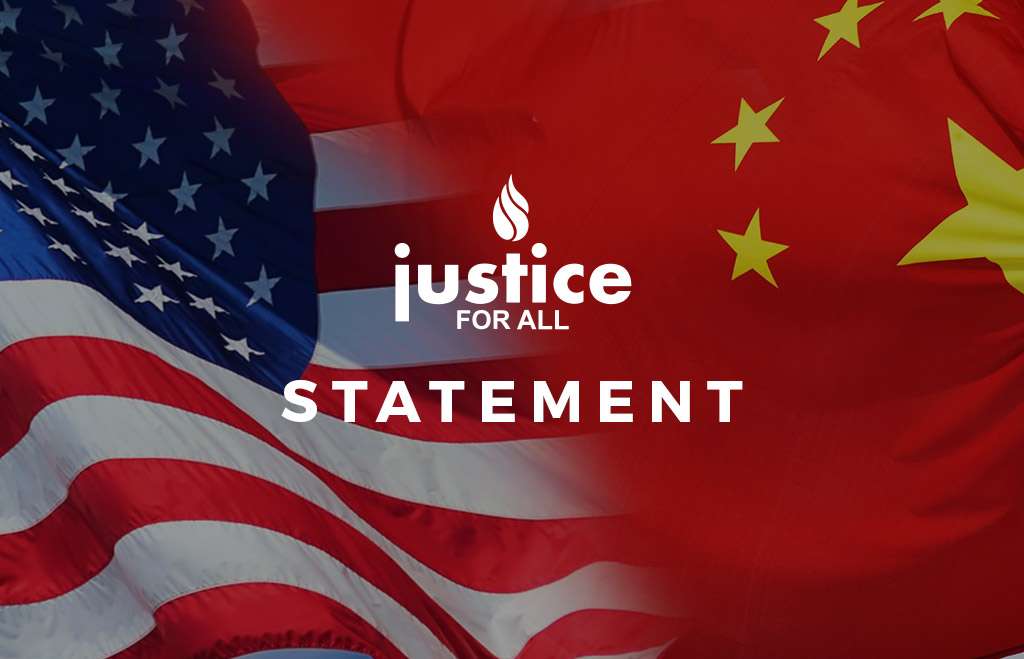Justice For All’s Save Uyghur Campaign commends Mishel Kondi, a human security analyst at C4ADS,…
China’s Renaming of Uyghur Villages an Act of Genocide

June 28, 2024
China has been renaming Uyghur villages in East Turkistan over the last decade. New research from Human Rights Watch (HRW) has discovered a policy that systematically renames Uyghur villages. Over 600 villages have had their culturally, historically and religiously significant Uyghur names replaced by names connected to Chinese Communist Party ideology. The top three new names are “Happiness,” “Unity” and “Harmony.”
“This policy of severing the Uyghur connection to their land, language and history amounts to religious and cultural genocide. We must act to prevent it before it is irreversibly lost,” said Imam Abdul Malik Mujahid, President of Justice For All.
Such a systematic erasure of Uyghur cultural and historical identities aligns with well-documented but insufficiently countered grievous human rights abuses in the region, including mass detentions and surveillance of Uyghurs.
Personal accounts described in the HRW report show the consequences of renaming East Turkistan’s villages. One Uyghur described profound disorientation and loss after being released from a re-education camp and unable to recognize the new name of her village. She had difficulty accessing essential services because their records no longer matched her village’s historical name. These stories are evidence that the renaming policy is not simply administrative: it disrupts the social fabric of one’s cultural heritage.
China’s effort to erase Uyghur religious and cultural expressions is part of its ongoing genocide of Uyghurs, which has been denounced by the U.S. Department of State. Renaming villages is not the first instance of China’s efforts to suppress Uyghur culture. Since 2017, Chinese authorities have damaged or destroyed two-thirds of East Turkistan’s mosques under various pretexts. In the historic city of Kashgar, the Chinese government has been removing minarets from mosques, painting over Arabic calligraphy and installing surveillance cameras in the prayer halls. The destruction of cultural and religious property is considered part of the late stages of genocide.
Justice For All, a genocide-prevention organization, reminds us that the names of places, like the language and daily practices of a people, are intrinsic to their identity and survival. They are not just geographical identifiers; they are repositories of history and culture. As the Chinese state deliberately repurposes these names, it is rewriting Uyghur history and reconfiguring the cultural landscape in favor of a singular national narrative that excludes histories of ethnic groups.
- We call on the U.S. government, as well as the United Nations and all state actors, to recognize that this renaming policy is part of China’s systematic campaign of cultural destruction and genocide, and to categorize it as a crime against humanity.
- Furthermore, we urge the international community to intensify diplomatic and economic pressures on Beijing to cease these practices immediately and to restore the original names of these villages as part of a broader restitution and reconciliation process.
- We appeal to global civil society and governmental bodies to bolster their support for measures that protect and preserve the cultural heritage of the Uyghur people.
Such renaming of villages in East Turkistan is not an isolated issue, but a symptom of a much larger crisis: a clear indicator of the Chinese government’s disregard for international norms and its continued violation of the human rights of Uyghurs. Immediate, unified and robust international action is imperative to uphold these communities’ rights to maintain and celebrate their cultural identities. Justice For All continues to amplify Uyghur grievances and raise awareness aimed at addressing and resolving these human rights violations.



